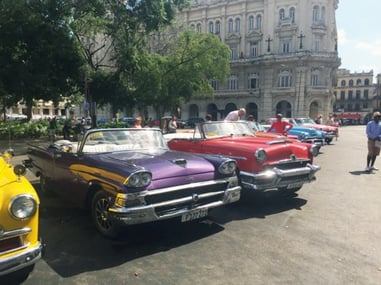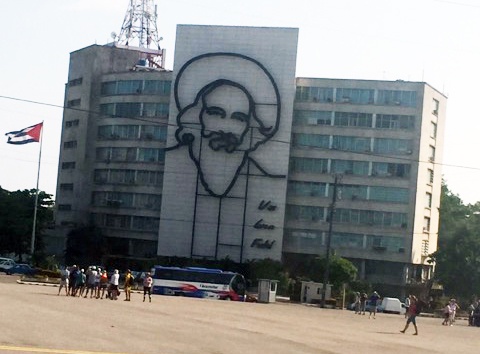I recently traveled to the timeworn country of Cuba with a group of interested tourists and was exposed to a simpler life – sometimes too simple. (Toilet seats are good to have. Right, ladies?)
 For seven days, I toured the streets of Cuba, met some really genuine people and indulged in a culture that is far from the one I am accustomed to.
For seven days, I toured the streets of Cuba, met some really genuine people and indulged in a culture that is far from the one I am accustomed to.
I went in with my eyes wide open and eager for new experiences. I perceived Cuba to be “old-school cool” with classic cars, stately buildings and a laid-back culture. My perceptions were pretty close. Here are a few of my observations:
- Scarcity can breed ingenuity.
From the outside looking in, it appeared there was a scarcity of everything. From dilapidated buildings to rugged streets, the utter lack of resources over the past half century was evident. What the people of Cuba have been able to do with so little is remarkable. While I own classic cars as a hobby, the people of Cuba keep them running out of necessity. With little to work with, they have adapted things to make them useful way longer than they were intended. What we throw away in America, they give new – and longer – life to. - Breaking out of repression is hard, but it can happen.
Cuba has been in a state of economic repression since the 1960s. The average person makes $300 per year and even doctors only earn about $1,000. That leaves almost everything out of reach and deters motivation. The biggest area of opportunity is for operators who have an asset and their compensation is tied to hospitality and tourism. A gentleman who owns a classic car and offers “behind the scenes” tours of the countryside to tourists can earn $60 an hour. These microenterprises provide hope in a country in transition.
- Complacency comes with lack of competition.
We stayed at one of the nicest hotels in the country. Behind the stately exterior, the amenities, cleanliness and service fell short of expectations. What they consider to be a five-star hotel would probably be a three star here. The government owns almost everything, leaving little competition. It made me wonder what will happen when a U.S. hotel chain opens new accommodations across the street. How will the current hotels compete? In my experience, we become better when we see better. I hope that is the case for Cuba, too.
- There’s always an eye on the United States.
We heard concerns about the U.S. Presidential Election and it was clear who they wanted to see elected. Interestingly enough – even though they have an almost 85-year-old dictator, Raul Castro, and his almost 90-year-old brother, Fidel, running their country – they seemed more concerned about us. After seeing how the people live, it’s hard for me to understand the perceived deep respect they have for their leaders. It’ll be interesting to see how that succession plays out.
 The American influence coming to Cuba will be disruptive. Their people are used to the government taking care of their healthcare, rationing food and providing employment for the strong majority. They seem to have a strong sense of contentment with it all.
The American influence coming to Cuba will be disruptive. Their people are used to the government taking care of their healthcare, rationing food and providing employment for the strong majority. They seem to have a strong sense of contentment with it all.
It took decades to create the current state of affairs in Cuba. Any transition will need to be slow – the people will not be ready.
During my stay in Cuba, I had zero contact outside of the group I was with – no email, Internet or even phone calls. I appreciated the slower pace of life and the complete contentment the people had in a country with so little. I’m not sold on their way of life, but there were certainly things that appealed to me.
Thank you to Lee Hurd and Bursch Travel for hosting this unique opportunity. It was an interesting experience, and I will definitely go back to see the pace of progress.


